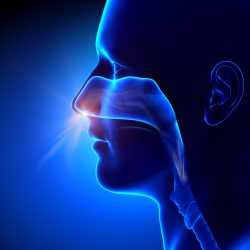 Beneficial bacterial strains reside in our skin, genital tracts and guts and have been shown to play an important role in human health. Researchers have now found that some of these good bacteria also reside in our noses!
Beneficial bacterial strains reside in our skin, genital tracts and guts and have been shown to play an important role in human health. Researchers have now found that some of these good bacteria also reside in our noses!
The team found that people with chronic sinus and nasal inflammation have fewer lactobacilli in their upper respiratory tract than healthy controls. They were also able to identify a specific strain of this bacteria which has evolved to better survive the oxygen rich environment of the nose.
For part of their study, the team developed a proof of concept nasal spray which could deliver lactobacilli to the nose. Here the bacteria were able to colonize the upper respiratory tract of healthy participants.
To see if bacteria we typically associate with gut health have a role in the health of the upper respiratory tract, the team compared the nose bacteria between 100 healthy participants and 225 patients who suffered from chronic rhinosinusitis. They looked at the prevalence of 30 varying families of bacteria in the upper respiratory tract of the participants. They found that the healthy participants had a greater abundance of lactobacilli than the patients – up to ten times more in some areas of the nose.
Lactobacilli are well known rod shaped, beneficial bacteria that contain pathogen inhibiting properties because they produce lactic acid through the fermentation of sugar. However, these bacteria have never been studied in detail in the nose.
The team took a closer look and found a specific strain of the Lacticaseibacillus that not only showed some antimicrobial and anti-inflammatory effects against pathogens, but also some unique features that enables the strain to adapt better to the environment of the nose. Most lactobacilli prefer to grow in the absence of oxygen, however the identified strain showed unique genes that made it capable in coping with the higher oxidative stress levels in the nose.
The team also observed the bacteria was covered with flexible, hair like tubes called fimbriae which enable them to adhere to the surface cells in the nose which indicated an interaction between the host and the bacteria.
The team looked to verify their findings in vivo. However, a limitation is that there are actually no good mechanistic models or animal models to study the interaction of bacteria in the nose and human host. The microbiome of the nose of mice compared to humans is certainly different. Also, mice breathe through their nose and they do not get chronic rhinosinusitis and have fewer allergies and inflammations.
However, the results from the lab and the long history of the safe use of lacatobacilli allowed the team to study the bacteria in humans instead of using animal models. They created a kind of probiotic nasal spray with a selected lactobacillus strain in the unique formulation for 20 healthy participants.
Introducing bacteria to the nose can be a challenge because the nose is so good at filtering out foreign substances. Any substance introduced to the nose will typically disappear within 15 minutes. However, after administering the spray twice daily for two weeks, the bacteria remained in the nose longer than 15 minutes. They colonized the nose for up to two weeks without any adverse effects.
The study using the spray was not set up to look at beneficial effects, however anecdotally some of the participants noted having fewer nasal problems and said they could also breathe better.
The next step for the team is to understand if the fimbraie and the ability to endure oxidative stress are key to the beneficial anti-inflammatory properties of the strain. They also want to identify which antimicrobial molecules the stain produces in addition to the lactic acid.
Ultimately, their goal is the develop therapeutics based on nasal probiotics to help improve the symptoms of people suffering from sinusitis. Sinusitis people don’t have a lot of treatment options. And with treatments that are available, problems like antibiotic resistance and side effects often occur. The team believes there are certain patients who would benefit from remodeling their microbiome and introducing beneficial bacteria in their nose to help reduce certain symptoms.
To view the original scientific study click below





